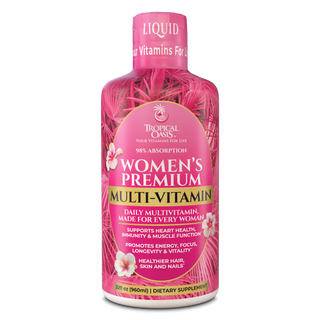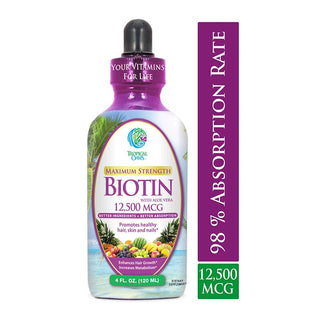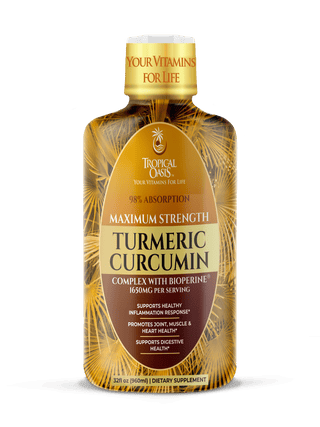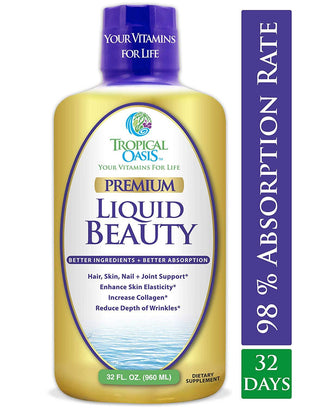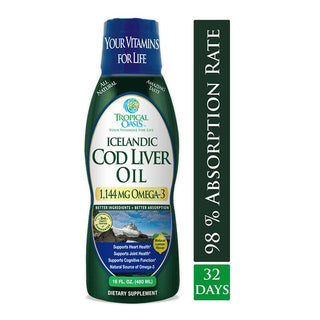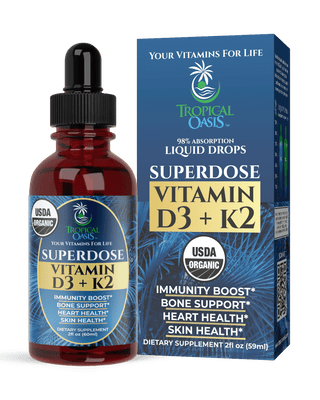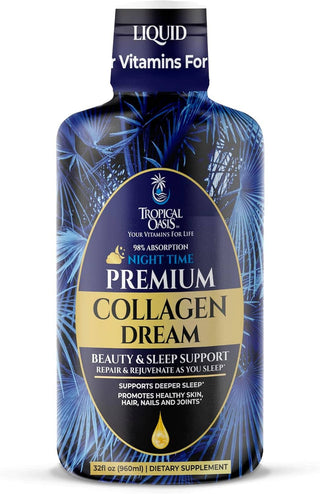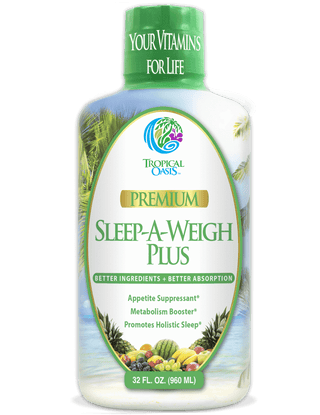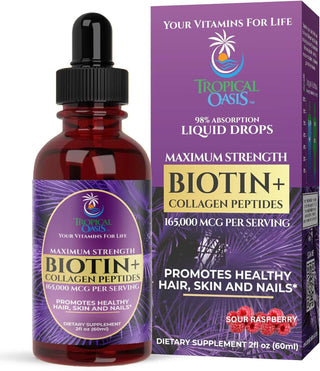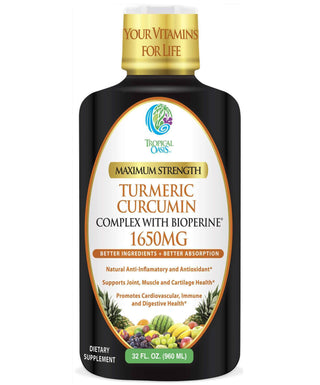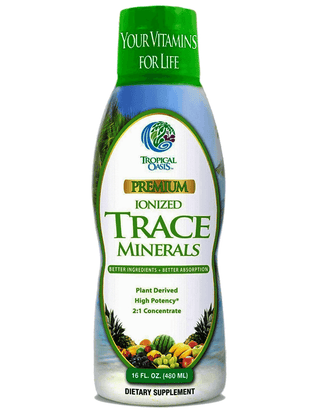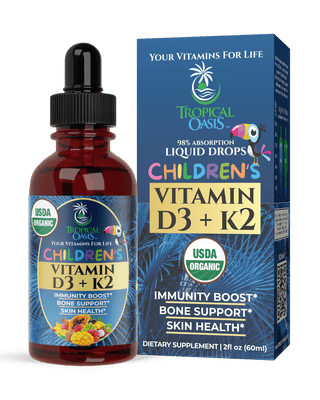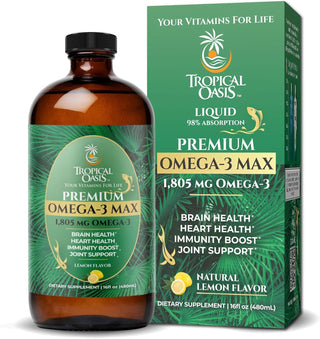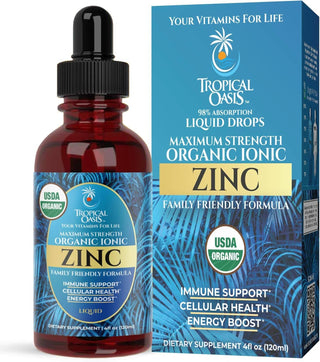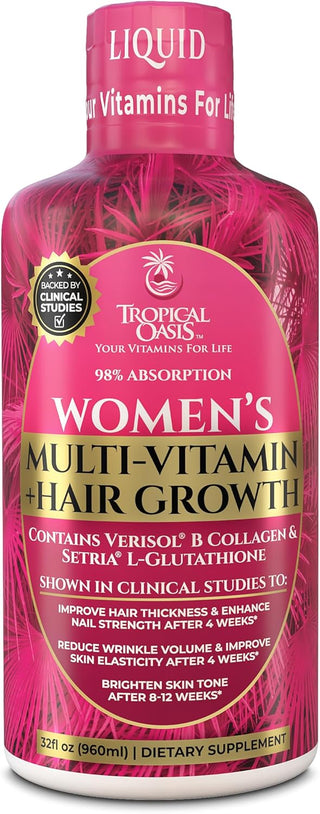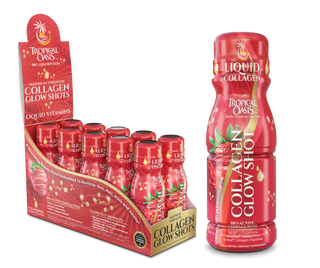Beauty & Skin Care
Women's Liquid Multivitamin + Hair Growth - with Verisol Collagen
Regular price
$69.99
$48.99
- Unit price
- /per
You’re viewing 1-16 of 16 products
Frequently Asked Questions
Healthy skin relies on a variety of vitamins to function and look its best. Key vitamins that play essential roles in skin health include vitamins A, C, D, and E, as well as certain B vitamins and minerals. Each of these vitamins contributes to skin in specific ways, such as protecting against environmental damage, supporting skin elasticity, and maintaining hydration. Vitamin A promotes cell turnover, helping to keep skin smooth and preventing rough patches. Vitamin C boosts collagen production, which is critical for firm, youthful-looking skin. Vitamin D is essential for cellular repair and overall skin health, while vitamin E acts as an antioxidant that protects skin from free radicals and environmental stressors.
When it comes to achieving a healthy, radiant complexion, vitamins play an essential role by supporting various skin functions and protecting against external damage. Let's explore how different vitamins benefit skin health in multiple ways:
Collagen Production:
- Vitamin C is a major contributor to collagen synthesis, a protein that provides structure and elasticity to the skin. Higher collagen levels help reduce the appearance of fine lines and wrinkles, giving the skin a firmer, smoother look.
- Vitamin A also plays a role in collagen production by encouraging skin cell turnover, which helps maintain a youthful and resilient complexion.
Antioxidant Protection:
- Vitamin E is known for its strong antioxidant properties, shielding skin cells from damage caused by free radicals, which come from sources like UV rays and pollution. This protection helps delay signs of aging and promotes overall skin health.
- Vitamin C is another powerful antioxidant, protecting against environmental stressors while also brightening the skin and promoting a more even complexion.
Hydration and Moisture Retention:
- B vitamins, particularly B3 (niacinamide) and B5 (pantothenic acid), help the skin retain moisture by strengthening its natural barrier. This supports hydration, reduces dryness, and keeps skin looking supple and soft.
- Vitamin D is also essential for maintaining the skin’s hydration balance and overall health, promoting smoother skin texture and improved resilience.
Wound Healing and Skin Repair:
- Vitamin K assists in wound healing and reduces the appearance of bruises and scars. It helps the body’s natural healing process, making it beneficial for anyone dealing with blemishes or minor skin injuries.
- Vitamin A also aids in repair by supporting skin cell regeneration, which helps in healing damaged areas of the skin and maintaining a smoother surface.
Reducing Inflammation:
- Vitamin D helps reduce inflammation, making it helpful for managing conditions like acne, eczema, and psoriasis. Its anti-inflammatory properties promote a more even, calm complexion.
Each of these vitamins contributes uniquely to skin health, making a strong case for incorporating a variety of vitamins into your daily routine for a balanced, radiant complexion.
To achieve glowing, radiant skin, certain vitamins stand out for their ability to brighten and even out skin tone:
- Vitamin C: Known as a skin-brightening powerhouse, vitamin C not only aids in collagen production but also reduces pigmentation, dark spots, and dullness. Its antioxidant properties help neutralize environmental damage, resulting in a more luminous complexion.
- Vitamin E: Working in tandem with vitamin C, vitamin E is an antioxidant that protects skin cells and maintains moisture levels. This vitamin is especially effective in creating a natural glow by reducing dryness and giving the skin a smooth, hydrated appearance.
- Vitamin A: Often used in skincare as retinol, vitamin A promotes cell turnover, which can reveal fresher, more vibrant skin. It also helps reduce fine lines and uneven texture, making skin appear youthful and naturally radiant.
- B Vitamins: Specifically, niacinamide (vitamin B3) supports the skin’s moisture barrier, which keeps it hydrated and prevents dullness. Biotin (vitamin B7) is also linked to improving skin health and contributing to a radiant look.
- Vitamin D: Known for its anti-inflammatory properties, vitamin D soothes the skin and promotes overall health, leading to a clearer, more radiant complexion.
Combining these vitamins in your skincare routine or diet can effectively support glowing, healthy-looking skin by targeting brightness, hydration, and overall texture.
Yes, specific vitamins can help reduce the appearance of fine lines and wrinkles by supporting collagen production, hydrating the skin, and protecting it from damage:
Vitamin A
Retinol, a derivative of vitamin A, is a popular anti-aging ingredient because it promotes skin cell turnover and stimulates collagen production. This reduces fine lines, smooths the skin’s surface, and improves elasticity.
Vitamin C
Known for its ability to boost collagen synthesis, vitamin C helps maintain skin’s firmness and elasticity, making it effective for reducing wrinkles. Its antioxidant properties also protect against UV damage, one of the main contributors to premature aging.
Vitamin E
This vitamin moisturizes and protects the skin from oxidative damage, which can lead to wrinkles over time. By keeping skin cells healthy and hydrated, vitamin E reduces the risk of fine lines caused by dryness.
B Vitamins
Niacinamide (vitamin B3) strengthens the skin’s barrier and locks in moisture, which keeps skin plump and reduces the visibility of fine lines. Niacinamide also improves skin texture and reduces the appearance of enlarged pores, enhancing smoothness.
Vitamin D
By supporting the skin’s natural repair processes, vitamin D helps reduce signs of aging like fine lines and wrinkles, especially for those with inflammatory skin conditions. Its anti-inflammatory properties contribute to smoother, younger-looking skin.
Vitamin A is a powerful vitamin for skin health, offering several benefits that contribute to a clearer, smoother, and more youthful complexion:
Cell Turnover
Vitamin A promotes cell turnover, helping to shed dead skin cells and reveal fresh skin underneath. This process reduces roughness, improves texture, and gives the skin a smoother appearance.
Anti-Aging
Retinol, a popular form of vitamin A, boosts collagen production, which helps to reduce the appearance of fine lines and wrinkles. This makes it a key ingredient in many anti-aging skincare products.
Acne Reduction
Vitamin A helps regulate oil production and prevents clogged pores, making it effective in reducing acne breakouts. Its ability to speed up skin cell renewal also helps heal existing acne more quickly.
Hyperpigmentation
By encouraging even cell turnover, vitamin A can reduce dark spots and pigmentation, resulting in a more even skin tone. This is especially beneficial for individuals with sunspots, age spots, or post-inflammatory hyperpigmentation from acne.
Skin Elasticity
By promoting collagen synthesis, vitamin A helps maintain skin’s elasticity, giving it a firmer, plumper look over time.
Tropical Oasis offers a range of liquid supplements designed specifically to enhance skin health and promote a radiant complexion. Some of their key products for skin health include:
- Premium Liquid Beauty Supplement: This supplement combines biotin, vitamins A, C, and D, along with hydrolyzed collagen to support hair, skin, and nails, promoting a glowing, youthful complexion.
- Biotin for Hair Growth: Formulated with 12,500 mcg of biotin, this product helps strengthen hair and nails, supporting skin health by enhancing cell regeneration and repair.
- Liquid Biotin & Collagen Drops: These drops provide a powerful dose of biotin and collagen, which are essential for maintaining skin elasticity, hydration, and a smooth texture.
- Vitamin D3 + K2 Drops: Combining vitamins D3 and K2, this supplement supports skin health by promoting cellular repair, reducing inflammation, and enhancing the skin's natural barrier.
- Premium Collagen Dream - Beauty & Sleep Support: This formula offers collagen along with sleep-promoting ingredients, supporting overnight skin repair and leaving the skin refreshed and rejuvenated.
Each of these products is formulated to maximize absorption and deliver essential nutrients directly to the body, making them effective options for those seeking targeted skin health support.
How Do Vitamin Deficiencies Affect Skin Appearance?
Vitamin deficiencies can have a noticeable impact on your skin's health and appearance. When your body lacks essential vitamins, the skin often reflects these imbalances through various symptoms:
- Vitamin A Deficiency: May lead to dry, rough, or scaly skin. In severe cases, it can cause a condition called keratosis pilaris, where small bumps appear on the skin.
- Vitamin C Deficiency: Results in dull, uneven skin tone and slower wound healing. Severe deficiency (scurvy) can cause bleeding gums and rough, dry skin.
- Vitamin D Deficiency: Can contribute to inflammation, increased sensitivity, and conditions like eczema or psoriasis. A lack of vitamin D may also impair the skin's ability to repair itself.
- Vitamin E Deficiency: Leads to dryness, irritation, and increased vulnerability to UV damage. Over time, this can result in premature aging signs like wrinkles and fine lines.
- B Vitamin Deficiency: A lack of biotin (B7) often results in dry, flaky skin and may even contribute to rashes. Niacin (B3) deficiency can lead to pellagra, a condition characterized by red, cracked, and inflamed skin.
Recognizing these signs and addressing them through diet or supplementation can help restore your skin’s health and vitality.
Are Liquid Supplements More Effective For Skin Health?
Liquid supplements have gained popularity in recent years for their potential benefits over traditional capsules or tablets, especially when it comes to promoting skin health. Here’s how they might be more effective:
- Faster Absorption: Liquid supplements are absorbed more quickly by the body, ensuring that vitamins and nutrients are delivered efficiently to the skin and other tissues.
- Higher Bioavailability: Many liquid supplements are formulated to enhance bioavailability, meaning the body can use a greater percentage of the nutrients compared to pills.
- Ease of Consumption: For individuals who struggle with swallowing pills, liquid supplements provide a convenient alternative.
- Customizable Dosages: Liquid forms allow for flexible dosing, which is helpful for tailoring your intake of specific vitamins based on your skin’s unique needs.
- Combination of Nutrients: Liquid supplements often blend vitamins like A, C, D, and E with other beneficial ingredients like collagen and biotin, creating a comprehensive formula for skin health.
However, the effectiveness of liquid supplements ultimately depends on the quality of the product and consistency in usage. Choosing reputable brands with well-res
Can Vitamins Help Protect Against Sun Damage?
Yes, certain vitamins play a crucial role in protecting your skin from sun damage and aiding in recovery after exposure to harmful UV rays. Here’s how:
Vitamin C
This potent antioxidant neutralizes free radicals generated by UV radiation, reducing oxidative stress and preventing long-term damage like wrinkles and dark spots. It also boosts the effectiveness of sunscreen when applied topically.
Vitamin E
Known for its ability to absorb UVB rays, vitamin E provides an additional layer of protection to your skin. When paired with vitamin C, it offers enhanced defense against sun damage and supports repair.
Vitamin A
Retinoids, derived from vitamin A, help repair sun-damaged skin by promoting cell turnover. This can reduce the appearance of pigmentation and fine lines caused by prolonged sun exposure.
Vitamin D
While sunlight is the primary source of vitamin D, this vitamin also helps repair skin and reduce inflammation caused by excessive sun exposure. However, excessive sun exposure without protection can deplete vitamin D levels over time.
Vitamin K
Although less known, vitamin K aids in healing sun-related skin damage, such as bruising and discoloration, and supports recovery.
What’s The Role Of Minerals In Skin Health Alongside Vitamins?
While vitamins are essential for skin health, minerals also play a critical role in maintaining and enhancing your skin’s appearance and function. Here’s how key minerals complement vitamins for optimal skin health:
- Zinc: Known for its anti-inflammatory properties, zinc helps manage acne, promotes wound healing, and protects the skin from UV damage. It also supports the skin’s natural barrier, preventing moisture loss.
- Selenium: This powerful antioxidant works alongside vitamins C and E to neutralize free radicals, reducing oxidative stress and preventing premature aging. Selenium also helps protect the skin from sun damage.
- Magnesium: Vital for maintaining the skin’s elasticity and hydration, magnesium calms irritated skin and reduces inflammation. It can also help in managing conditions like eczema and rosacea.
- Copper: An essential trace mineral, copper supports the formation of collagen and elastin, contributing to firmer, more youthful skin. It also helps in the production of melanin, which protects the skin from UV radiation.
- Iron: Adequate iron levels promote healthy blood circulation, ensuring that oxygen and nutrients reach the skin efficiently. A deficiency can result in pale or dull-looking skin.
By incorporating both vitamins and minerals into your diet or supplement routine, you can ensure a balanced approach to skincare, targeting hydration, elasticity, repair, and protection.

